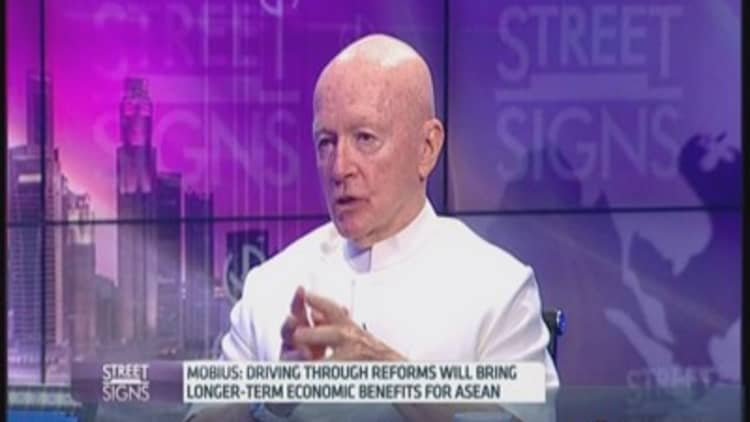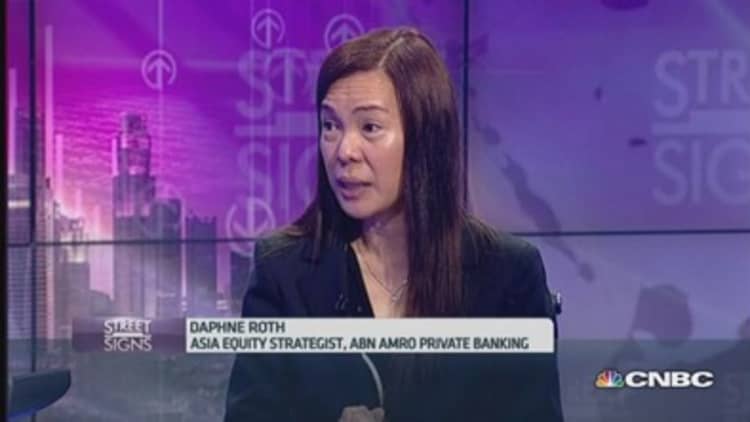Thailand's benchmark stock index has outperformed most of Southeast Asia since the start of 2015, but analysts are divided on whether the market remains attractive.
The SET index rose over 6 percent in the first four weeks of the year, following a 15.3 percent surge in 2014. That leaves it ahead of a 5.2 percent gain in the Philippines, and a rise of nearly 2 percent in Southeast Asian peers Singapore and Malaysia, and a 0.5 percent rise in Indonesia's Jakarta Stock Exchange Composite index. Only Vietnamese shares managed to outrun Thailand, with a near 7 percent jump.
Read MoreAsia outperforms world markets in January
Positive support
Hopes that a 60 percent fall in crude oil prices could be a boon for Thailand have been driving the local bourse, which was trading near the key 1,600 level on Friday.
"Oil prices at $50 a barrel will put about one month's extra salary into consumer's pockets," Jalil Rasheed, investment director at Invesco, said. "With Thailand being a net oil importer, we are buying into the recovery."
Emerging markets guru Mark Mobius is also optimistic. Earlier this month, the executive chairman of Templeton Emerging Markets Group, told CNBC that the outlook for Thailand looks "very positive."
"Lower oil prices lessen inflation and enable the central bank to loosen up. Besides, the current administration is under pressure to boost the economy to make sure that people, on a political level, are happy," he said.

Headed by army chief General Prayuth Chan-ocha, Thailand's military seized power in a coup after nearly six months of political protests and two days of martial law last May. Since then, $3.8 billion worth of investment plans aimed at upgrading public infrastructure have been approved, along with an acceleration of project approvals by the Board of Investment to promote private investment.
All together, these factors could see the local bourse hit 1,810 points by the end of 2015, CLSA analysts wrote in a note.
"Thailand is undergoing reforms in politics, as well as energy and telecoms policies, promoting private investment and infrastructure spending. As the restructuring gains momentum this year, we expect the market to continue rerating as companies reap from investment-led growth, energy and digital [communications] reforms," said Suchart Techaposai, head of Thai research at CLSA, which has a "buy" call on state-owned oil and gas company PTT, Siam Cement and communication conglomerate True.
Read MoreThailand's economicgrowth view goes under the knife
Time to take profit?
However, not all market watchers are convinced.
Earlier this month, ABN Amro downgraded its rating on Thailand from neutral to underweight, citing a possible rise in political uncertainty this year.
"Given that the military government has to deliver this year, we have the drafting of the constitution, and the elections later this year. Political uncertainty will certainly be on the rise," Daphne Roth, head of Asian equity research at ABN AMRO Private Banking, told CNBC. "The SET index has also performed really well last year so valuations are no longer attractive. With the central bank downgrading its growth outlook, we decided to take profit."

Last month, the Bank of Thailand slashed its gross domestic product growth forecasts for 2014 to 0.8 percent, from the 1.5 percent it predicted in September. For 2015, it projects growth of just 4 percent, down from 4.8 percent, on the back of lower-than-expected government spending and a slow recovery in private investment, tourism income and exports.
Morgan Stanley also sees Thailand as its least preferred equity market within Southeast Asia, on the back of high valuations and low earnings recovery.
"Driven by a disappointing growth outlook and volatility ahead of the political transition process, Thai equity market risks significant valuation de-rating in 2015," analysts said in a note. "The key priority for the transition government over the next 12-24 months will likely be restoration of democracy so expectations for earnings also should be realistic."

